گردهمایی تورنتو برای ادای احترام میرگل خان نصیر و تصویب قطعنامه ای برای حاکمیت مستقل بلوچستان
 Zaffar Baloch - President, BHRC (Canada)
Zaffar Baloch - President, BHRC (Canada) Azam Bhatti - Sindh Rights
Azam Bhatti - Sindh Rights Abu Sufyan - Ahwazi Democratic Popular Front
Abu Sufyan - Ahwazi Democratic Popular Front Mir Akram Baloch - Organizer, BHRC (USA)
Mir Akram Baloch - Organizer, BHRC (USA) Tahir Gora - Poet, Talk Show Host, Punjabi Council (Canada)
Tahir Gora - Poet, Talk Show Host, Punjabi Council (Canada) Laurie Deamer - Human rights activist, USA
Laurie Deamer - Human rights activist, USA Munir Saami - Director, Progressive Writers Association (Canada)
Munir Saami - Director, Progressive Writers Association (Canada) Fawad Choudhury - Film producer, Bangladesh
Fawad Choudhury - Film producer, Bangladesh Senge Sering - Director, Gilgit Baltistan National Congress
Senge Sering - Director, Gilgit Baltistan National Congress Mumtaz Khan - Director, International Centre for Peace & Democracy
Mumtaz Khan - Director, International Centre for Peace & Democracy Tarek Fatah - Author & Columnist
Tarek Fatah - Author & Columnist
May 12th - A gathering in Toronto remembered Mir Gul Khan Naseer, the revolutionary poet of Balochistan, and paid tribute to a great son of the soil for his exceptional literary work and political struggles dating back to the 1930s. Baloch Human Rights Council (Canada) hosted the event; attended by Baloch, Punjabi, Kashmiri, Sindhi, Bangladeshi, and Ahwazi communities to express solidarity with the Baloch struggle for freedom and rights.
Related: Mir Gul Khan Naseer - An Introduction
The Mir Gul Khan Naseer day event commenced with a moment of silent contemplation in the memory of Baloch martyrs of the liberation struggle. Mohammad Ali Baloch initiated the evening with reciting revolutionary verse by the national poet of Balochistan. Mumtaz Baloch welcomed the guests and invited the speakers to shed light on life and struggles of Mir Gul Khan Naseer. She began by speaking on the importance and the relevance of the poet's literary and political endeavours with today's Balochistan. The main theme of the event: "Mir Gul Khan Naseer - A Poet's Struggle for Baloch Unity, Freedom and Social Change" echoes the challenges Baloch nation is confronting today in their collective struggle for nationhood and freedom from foreign dominance.
 Mohammad Ali Baloch - Secretary General, BHRC (Canada)
Mohammad Ali Baloch - Secretary General, BHRC (Canada) Mumtaz Baloch
Mumtaz Baloch
 Tarek Fatah and friends of Baloch struggle
Tarek Fatah and friends of Baloch struggle Mir Gul Khan Naseer in pictures
Mir Gul Khan Naseer in pictures Zaffar Baloch, Abu Sufyan, Salah Abu Sharif Al-Ahwazi
Zaffar Baloch, Abu Sufyan, Salah Abu Sharif Al-Ahwazi
Zaffar Baloch - President, BHRC (Canada)
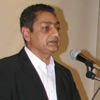 Mir Gul Khan Naseer was a creation of his times, a man whom history molded in the darkest hours of a nation to lead his people out of subjugation and into the light of freedom. For this pioneer of Baloch freedom struggle against the British colonial rule; freedom meant the beauty of human soul free from all forms of social injustices, foreign domination, and inequality based on systematic exploitation of common man. He believed that a nation cannot be free unless every individual member of a society is sanctioned the freedom of expression beyond the boundaries of social strata, race, colour, sex and ideology.
Mir Gul Khan Naseer was a creation of his times, a man whom history molded in the darkest hours of a nation to lead his people out of subjugation and into the light of freedom. For this pioneer of Baloch freedom struggle against the British colonial rule; freedom meant the beauty of human soul free from all forms of social injustices, foreign domination, and inequality based on systematic exploitation of common man. He believed that a nation cannot be free unless every individual member of a society is sanctioned the freedom of expression beyond the boundaries of social strata, race, colour, sex and ideology.(Full text of the speech)

Azam Bhatti - Spokesperson, Sindh Rights, expressed his solidarity with the Baloch struggle and emphasized on the historic ties between the two nations of Sindh and Balochistan. He stated that poets in any society are the visionary individuals who foresee the truth and guide their people to their destiny. He mentioned that the state-sponsored atrocities in Balochistan are now being repeated in Sindh and the nationalist leaders and activists are being disappeared and in some cases killed in custody and their bodies dumped. Mr. Bhatti emphasized on Sindhi-Baloch unity and struggle for a common national cause.
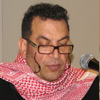
Abu Sufyan - Spokesperson, Ahwazi Democratic Popular Front stated that Ahwaz nation's struggle against the theocratic fascist state of Iran unites us with Baloch people, currently under occupation of Iran and Pakistan. Mr. Sufyan spoke in Arabic, the national language of the Ahwaz people. He mentioned the atrocities against his people by the fundamentalist regime of Iran that has denied cultural, political, and economic rights to the oppressed nationalities of the country. Mr. Sufyan added that freedom is the birth right of all nations under foreign occupation.
 Mir Akram Baloch - Organizer, BHRC (USA) began by congratulating all present in the hall on Mother's Day and saluted the Baloch mothers who gave birth to sons and daughters fighting for the rights of their motherland. Mr. Baloch recited poems in praise of Mir Gul Khan Naseer about his great love for his people and the sacrifices he made for the common Baloch - shepherds, peasants, students, and the poor tribal masses facing hardships under tyrant chieftains.
Mir Akram Baloch - Organizer, BHRC (USA) began by congratulating all present in the hall on Mother's Day and saluted the Baloch mothers who gave birth to sons and daughters fighting for the rights of their motherland. Mr. Baloch recited poems in praise of Mir Gul Khan Naseer about his great love for his people and the sacrifices he made for the common Baloch - shepherds, peasants, students, and the poor tribal masses facing hardships under tyrant chieftains.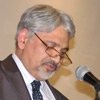 Tahir Gora - Poet and Spokesperson, Punjabi Council of Canada stated that the Punjabi dominance and military occupation of Balochistan must end immediately. Mr. Gora added that Baloch people's struggle for independence is a just cause and Balochistan will one day become a free nation. He emphasized that the Punjabi nation and its ruling classes have lost their sense of national heritage and don't feel proud of their language and cultural history - this is the reason why they never understood the significance of Balochi, Bengali, Sindhi, Seraiki, and Pashto as mother tongues and the importance of nationalist struggles as political movements that have challenged the defunct Pakistan Ideology based on "Two Nation Theory." He expressed his solidarity with the Baloch national liberation movement and added that it will end in victory and freedom. Mr. Gora also recited Punjabi poems including one by the great Sufi poet Buley Shah.
Tahir Gora - Poet and Spokesperson, Punjabi Council of Canada stated that the Punjabi dominance and military occupation of Balochistan must end immediately. Mr. Gora added that Baloch people's struggle for independence is a just cause and Balochistan will one day become a free nation. He emphasized that the Punjabi nation and its ruling classes have lost their sense of national heritage and don't feel proud of their language and cultural history - this is the reason why they never understood the significance of Balochi, Bengali, Sindhi, Seraiki, and Pashto as mother tongues and the importance of nationalist struggles as political movements that have challenged the defunct Pakistan Ideology based on "Two Nation Theory." He expressed his solidarity with the Baloch national liberation movement and added that it will end in victory and freedom. Mr. Gora also recited Punjabi poems including one by the great Sufi poet Buley Shah. Laurie Deamer (USA) - Human rights activist involved with Baloch struggle. Ms. Deamer presented a paper on Mir Gul Khan Naseer by Dr. Naseer Dashti.
Laurie Deamer (USA) - Human rights activist involved with Baloch struggle. Ms. Deamer presented a paper on Mir Gul Khan Naseer by Dr. Naseer Dashti.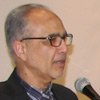 Munir Pervaiz Saami - Director, Progressive Writers Association (Canada) expressed his solidarity with the Baloch people in the darkest times of their history. Mr. Saami praised Mir Gul Khan Naseer for his intellectual contributions and steadfastness to the principles of enlightened humanism. He also recited his own poem in Urdu on the subject of struggles for freedom with an English translation of the verse.
Munir Pervaiz Saami - Director, Progressive Writers Association (Canada) expressed his solidarity with the Baloch people in the darkest times of their history. Mr. Saami praised Mir Gul Khan Naseer for his intellectual contributions and steadfastness to the principles of enlightened humanism. He also recited his own poem in Urdu on the subject of struggles for freedom with an English translation of the verse.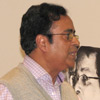 Fawad Choudhary - Film Producer, Bangladesh spoke on the subject of struggles of his people that culminated in the liberation of Bangladesh from Pakistan in 1971. Mr. Choudhary praised Mir Gul Khan Naseer for his role in developing Balochi language and poetry in relation to modern and progressive trends in literature. He specially mentioned about Mir Gul Khan Naseer's 1975 poem (written in Hyderabad Jail) on the assassination of Sheikh Mujeeb-ur-Rehaman, the founder of Bangladesh.
Fawad Choudhary - Film Producer, Bangladesh spoke on the subject of struggles of his people that culminated in the liberation of Bangladesh from Pakistan in 1971. Mr. Choudhary praised Mir Gul Khan Naseer for his role in developing Balochi language and poetry in relation to modern and progressive trends in literature. He specially mentioned about Mir Gul Khan Naseer's 1975 poem (written in Hyderabad Jail) on the assassination of Sheikh Mujeeb-ur-Rehaman, the founder of Bangladesh.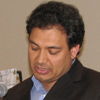 Senge Sering - Director, Gilgit Baltistan National Congress (USA) expressed his solidarity with the Baloch peoples' struggles for freedom and rights. Mr. Sering praised the Baloch mothers on the occasion of Mother's Day and saluted them for their bravery in playing a leading role in the movement for raising voice for the missing persons in Balochistan. He also described the political issues facing people of Gilgit Baltistan in their struggle against the occupation forces of Pakistan and China.
Senge Sering - Director, Gilgit Baltistan National Congress (USA) expressed his solidarity with the Baloch peoples' struggles for freedom and rights. Mr. Sering praised the Baloch mothers on the occasion of Mother's Day and saluted them for their bravery in playing a leading role in the movement for raising voice for the missing persons in Balochistan. He also described the political issues facing people of Gilgit Baltistan in their struggle against the occupation forces of Pakistan and China.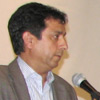 Mumtaz Khan - Director, International Centre for Peace & Democracy stated that the conflict in Kashmir and Balochistan originated with the creation of Pakistan by the British Raj. Mr. Khan expressed his solidarity with the people of Balochistan in their endeavours for freedom from foreign occupation and subjugation. He spoke at length on the terrorist nature of the Pakistani state and the army's role in spreading political chaos and militarism in the region with serious dangers of war and nuclear repercussions. He explained that without the end to the military's dominant role in Pakistan and the dismantling of the structures of terrorism, the Taliban-linked proxy wars in Kashmir and Balochistan will grow, engulfing the entire region in a never-ending nightmare.
Mumtaz Khan - Director, International Centre for Peace & Democracy stated that the conflict in Kashmir and Balochistan originated with the creation of Pakistan by the British Raj. Mr. Khan expressed his solidarity with the people of Balochistan in their endeavours for freedom from foreign occupation and subjugation. He spoke at length on the terrorist nature of the Pakistani state and the army's role in spreading political chaos and militarism in the region with serious dangers of war and nuclear repercussions. He explained that without the end to the military's dominant role in Pakistan and the dismantling of the structures of terrorism, the Taliban-linked proxy wars in Kashmir and Balochistan will grow, engulfing the entire region in a never-ending nightmare.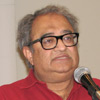 Tarek Fatah - Author and Columnist for Toronto Sun. Mr. Fatah described in-depth the challenges Baloch people are facing today in their fifth war of independence from Pakistan. He stressed on the role of Baloch leadership that stands disunited while their people suffer at the hands of the state security forces and army's proxy death squads with impunity. Moreover, Mr. Fatah maintained that lack of unity is a major drawback in the movement disenchanting Baloch youths and the international community alike. He emphasized that Pakistani authorities whether civilian or military should leave Balochistan immediately because they do not have any legal or moral authority to continue the occupation that began with the invasion of Kalat in 1948. Mr. Fatah, speaking on the issue of general elections 2013, said that the Pakistani establishment has manufactured the results in order to hand over KP and Balochistan to ISI-controlled puppets to manage the post-2014 scenario of withdrawal of NATO troops from Afghanistan.
Tarek Fatah - Author and Columnist for Toronto Sun. Mr. Fatah described in-depth the challenges Baloch people are facing today in their fifth war of independence from Pakistan. He stressed on the role of Baloch leadership that stands disunited while their people suffer at the hands of the state security forces and army's proxy death squads with impunity. Moreover, Mr. Fatah maintained that lack of unity is a major drawback in the movement disenchanting Baloch youths and the international community alike. He emphasized that Pakistani authorities whether civilian or military should leave Balochistan immediately because they do not have any legal or moral authority to continue the occupation that began with the invasion of Kalat in 1948. Mr. Fatah, speaking on the issue of general elections 2013, said that the Pakistani establishment has manufactured the results in order to hand over KP and Balochistan to ISI-controlled puppets to manage the post-2014 scenario of withdrawal of NATO troops from Afghanistan.
The Mir Gul Khan Naseer event concluded with the presentation of a resolution on the independence and sovereignty of Balochistan. The resolution was presented by Zaffar Baloch - President, BHRC (Canada) and was adopted unanimously by the house on May 12, 2013. (Click for the text of the resolution).
Mir Gul Khan Naseer - An Introduction
Dr. Naseer Dashti
Widely known as one of the pioneers of the Baloch national struggle in the 20th century, Mir Gul Khan Naseer was a prominent progressive politician, poet, historian and journalist. He is regarded as "Malik-ul-Shuaraa: for his valuable literary contribution to the Baloch national struggle. Mir Gul Khan Naseer was born on May 14, 1914 in Noshki, Balochistan in the family of Mir Habib Khan and Bibi Hooran. His father belonged to the Zagar Mengal branch of the Mengal tribe and his mother was a Rakhshani of the Badini tribe.
Literature
Mir wrote poems in English, Urdu, Persian, Brahui and Balochi. He began writing Urdu poetry of revolutionary nature, aimed at raising political awareness among the Baloch people in general and the Baloch youth in particular. He soon switched from Urdu to start composing poetry in Balochi and gave a new dimension to modern Balochi revolutionary poetry. "Gulbang" the first collection of his Balochi poetry appeared in 1951. It was regarded as the Bible of the Baloch revolutionary poetry. His literary work was not confined to poetry but he is also respected as an authority on Baloch history. He wrote a series of books on Baloch history and also translated several books and collection of poetries from different languages into Balochi. A list of his literary work includes:
GulBaang (1951), History of Balochistan (1952) (Urdu) Volume 1, History of Balochistan (1957) (Urdu) Volume 2, Daastaan-e-Dostain o Sheereen (1964), Koch o Baloch (1969), Garand (1971), Balochistan Kay Sarhadi Chaapa Maar (1979), Seenai Keechaga (1980), Mashad Na Jang Naama (1981), Shah Latif Gusheet (1983), Gulgaal (1993) is the ninth compilation Mir Gul Khan's poetry. Shanblaak (1996) is Mir Gul Khan Nasir's tenth collection of Balochi Poetry which also includes Urdu translations.
Mir wrote poems in English, Urdu, Persian, Brahui and Balochi. He began writing Urdu poetry of revolutionary nature, aimed at raising political awareness among the Baloch people in general and the Baloch youth in particular. He soon switched from Urdu to start composing poetry in Balochi and gave a new dimension to modern Balochi revolutionary poetry. "Gulbang" the first collection of his Balochi poetry appeared in 1951. It was regarded as the Bible of the Baloch revolutionary poetry. His literary work was not confined to poetry but he is also respected as an authority on Baloch history. He wrote a series of books on Baloch history and also translated several books and collection of poetries from different languages into Balochi. A list of his literary work includes:
GulBaang (1951), History of Balochistan (1952) (Urdu) Volume 1, History of Balochistan (1957) (Urdu) Volume 2, Daastaan-e-Dostain o Sheereen (1964), Koch o Baloch (1969), Garand (1971), Balochistan Kay Sarhadi Chaapa Maar (1979), Seenai Keechaga (1980), Mashad Na Jang Naama (1981), Shah Latif Gusheet (1983), Gulgaal (1993) is the ninth compilation Mir Gul Khan's poetry. Shanblaak (1996) is Mir Gul Khan Nasir's tenth collection of Balochi Poetry which also includes Urdu translations.
Mir Gul Khan Naseer was posthumously awarded Sitara-i-Imtiaz (President's Award) in 2001 for his literary services. In 1962, he could not travel to receive the Lenin Prize, a literary award from the then USSR government as he was not allowed to visit Moscow by the military regime of Pakistan.
Politics
From the very beginning Mir Gul Khan Naseer was attracted to nationalist politics. He began the political career during his student life in Lahore, where he played an important role in Baloch aur Balochistani Thalba Ki Anjuman, a student organization formed by the Baloch students on advice of Mir Yousaf Ali Khan Magsi. He participated actively in student politics and was part of various political organizations throughout his political career to strive for the rights of the people of Balochistan.
From the very beginning Mir Gul Khan Naseer was attracted to nationalist politics. He began the political career during his student life in Lahore, where he played an important role in Baloch aur Balochistani Thalba Ki Anjuman, a student organization formed by the Baloch students on advice of Mir Yousaf Ali Khan Magsi. He participated actively in student politics and was part of various political organizations throughout his political career to strive for the rights of the people of Balochistan.
In 1936, he became the president of the newly formed organization named Anjuman e Islamia e Kalat. The Anjuman did not last long and was banned by Kalat Government. In the following year, he became the first vice president of Kalat State National Party (KNSP). The party was seen as a potential threat to their interests both by the Khan of Kalat and the British colonial administration in Balochistan. After few years the party was banned by the Kalat administration and its leaders were persecuted on various pretexts.
The ban on KSNP was lifted during the last months of Khanate of Kalat before its annexation to Pakistan. However, because of its strong advocating of an independent Balochistan after the British withdrawal, the party was again banned by the Pakistani authorities in 1948.
In 1955 Mir Gul Khan and Mir Ghaus Bux Bizenjo formed Usthman Gal which was the first official nationalist party of the Baloch in Pakistan. In the following year, Usthman Gal was merged into Pakistan National Party (PNP). In 1957, Pakistan National Party was merged with Maulana Bhashani's Awami League to form the National Awami Party (NAP). From 1958 to 1970, Mir Gul Khan Naseer along with other Baloch nationalist leaders faced hardship resisting the military regime and was sent to jail on many occasions.
During the 1970 general elections, NAP managed to get a majority in Balochistan in which he won a seat in the provincial assembly. He served as the first Education Minister in the provincial governmental Khan Naseer tabled a bill in the Balochistan Assembly for the abolishment of Sardari System, which was passed by a large majority. When the NAP government was dismissed by Z.A. Bhutto, he was imprisoned along with other leaders and tried on the charges of treason against the state.
After his release in 1977 when Hyderabad Tribunal was disbanded by the military regime, he joined Wali Khan's National Democratic Party. However, soon he formed the Pakistan National Party (PNP) along with Mir Ghaus Bux Bizenjo. Due to political differences with his old time associate Mir Ghaus Bux Bizenjo, he then decided to resign from politics and concentrate all of his abilities towards literary work.
Throughout his political career from 1939-1978; Mir Gul Khan Naseer was arrested several times for his strong nationalistic activities. Altogether he spent nearly 15 years of his life in jail.
Mir Gul Khan died of lung cancer on December 6, 1983 and was buried in his ancestral village in Noshki on 7 December 1983.
With his huge literary contribution to Balochi language, his revolutionary poetry, and his commitment to the cause of Baloch nationalism, Mir Gul Khan will remain a legendary figure in the Baloch history forever.
Unite as a Free Nation or Perish as Slaves
by Zaffar Baloch
Mir Gul Khan Naseer was a creation of his times, a man whom history molded in the darkest hours of a nation to lead his people out of subjugation and into the light of freedom. For this pioneer of Baloch freedom struggle against the British colonial rule; freedom meant the beauty of human soul free from all forms of social injustices, foreign domination, and inequality based on systematic exploitation of common man. He believed that a nation cannot be free unless every individual member of a society is sanctioned the freedom of expression beyond the boundaries of social strata, race, colour, sex and ideology.
Mir Gul Khan Naseer's greatest achievement is the awareness he raised through literary and political education among the common people of Balochistan that has stood the test of time and formed the basis for the ongoing struggle against foreign occupation by Pakistan in1948. After winning a brief victory from the British colonial power in 1947, lasting only 227 days, Mir Gul Khan Naseer witnessed the invasion of Balochistan on March 27, 1948 by Pakistan's armed forces. Those 227 days of freedom from 100 years of British colonial rule left a lasting impression on the young mind of Gul Khan Naseer and his comrades; that occupying powers may come and go - Balochistan shall remain a free nation as long as the collective dreams of a people are materialized in a movement for independence.
Today we are witnessing the fifth wave of uprising and resistance against Pakistani occupation forces in Balochistan. It is noteworthy that each fresh wave of rebellion outweighed the one before, both, in level of political consciousness and social spread throughout Balochistan. Brutal military operations, aerial bombardment of villages, mass enforced disappearances, and kill & dump policies of the state run death squads failed to suppress the spirit of freedom of the Baloch nation in the last ten years.
With the failure of the military solution of the Balochistan conflict, Pakistani establishment has come up with the previously tested civilian face of managing grievances with the army calling the shots to contain the real issue of Pakistan's illegitimate occupation of Balochistan - the source of the conflict. We have witnessed that in the previous civilian administration.
Pakistan's 2013 general elections, the bloodiest in the history of the country and Balochistan's response of a successful boycott of the polls has proven that Baloch nation is no more interested in Islamabad's policies and institutions that will only serve the interests of the occupying power. The international observers representing European Union refused to be stationed in Balochistan during the elections due to security concerns. As international observers it is now their responsibility to inform the world about the concerns and the verdict the people of Balochistan have conveyed as their collective political will.
In light of the previous civilian administration, it is foreseeable that nothing will change for the people of Balochistan and the new civilian government shall remain helpless as ever or used as a tool to promote Pakistan Army's policies of crushing the Baloch struggle of freedom and rights.
People of Balochistan have spoken in favour of ending the 65-year Pakistani occupation of their land and resources by not taking part in the elections. Now the responsibility lies heavily on the Baloch leaders in exile and on ground to come up with a comprehensive road map for the sovereignty of Balochistan. The people are united, and unfortunately the leaders are not.
In the absence of a politically united movement, the common Baloch including the cream of our activists are suffering a sense of direction and the unwarranted disunity is creating further rifts, confusion, and unnecessary polarization that is damaging to the cause of freedom. We are losing the best of our cadres to enforced disappearances and targeted killings by the state security forces and their death squad militias.
It is the need of the hour that a national dialogue is initiated by the pro-independence leaders and organizations to resolve their differences whether petty or significant ones and come up with a united political platform representing broad sections of Baloch society with the single agenda of independence of Balochistan. Such a united platform would not only further consolidate the struggle on political grounds but also will have the mandate to play a larger role in the international arena acceptable to the West.
Today the significance of Mir Gul Khan Naseer's political philosophy and message to the nation and its leaders is even more relevant than during his own lifetime - unite as a free nation or perish in history as slaves. If not now - when? If not during the darkest hours of our history then what hope do we have as a people when systematically eliminated into non-existence. Historic opportunities appear and disappear with time. Unite now before it is too late. Baloch nation is suffering yet willing to sacrifice all for the cause - any setback at this critical juncture will be judged by history and the sole responsibility shall rest upon the leaders of the nation.
Zaffar Baloch,
President, BHRC (Canada)
Toronto, May 12, 2013
President, BHRC (Canada)
Toronto, May 12, 2013
Remembering Mir Gul Khan
Dr. Naseer Dashti
Early decades of 20th century was the period when the Baloch horizons were engulfed in the dark shadows of despair, frustration and a growing sense of total defeat and helplessness. It was the period when the Baloch resistance against the British and its ally the Persians, had been ruthlessly crushed. It was the period when under different boundary commissions, the body of the Baloch land had been dissected and it had been divided into various parts controlled by the Persians, the British and the Afghans. In Eastern Balochistan, the glorious resistance of the Baloch led by Marri, Bugti, Mengal, Zehri and Nosherwanis had ended in total defeat. Leader of the Bugti tribe Mir Ghulam Hussain Bugti had long been killed by the British and his head had been put on public display on the gate of the British Cantonment in Jacobabad. Legendary guerilla fighter Noora Mengal had been imprisoned. Sardar Noordin Mengal and Mir Azad Khan Nosherwani had been neutralized. A crushing defeat had been delivered to the Marri by the British forces. The champions of the Baloch resistance against the British Mir Baloch Khan Nosherwani and Nawab Khan Mohammad Zarakzai had been killed. In Sistan, the Baloch resistance led by Nahrui and Sanjarani tribes had been crushed jointly by the British, Afghan and the Persians. General Dyre with traitors like Ido Reiki was successful in bringing a reign of terror in Sarhad. Sardar Jiand khan and Sardar Khalil had been eliminated from the scene. In Western Makuran, the emerging Baloch chiefdom led by Mir Bahram and Mir Dost Mohammad Barakzai failed to gain firm roots and was crumbling under the increasing pressure from the Persians and its fall was eminent to every conscious Baloch. The Khanate of Kalat under the firm grip of the British was being ruled by degenerated Khans who were unable to express a remote respect for the Baloch honor, values and traditions. Majority of the Baloch Sardars were now protégés of the occupying forces. As the pawns of the British administration they were being used to undermine any remaining authority of the Baloch State.
It was the time when there was a general milieu of fear, defeatism, doubts, and distrust prevailing in the Baloch society. Engulfed in this terrible darkness, the Baloch were trying to peer deep into and were unable to find any light at the end of the tunnel. It was the time when the Baloch as a nation were stuck in a crack in the ground underneath a giant boulder. They were unable to move this giant boulder and there was no chance of rescue coming from anywhere. There was a great need of infusing some kind of hope among the Baloch masses.
In this hour of despair the infusion of hope among the Baloch came from a group of educated Baloch youth. These Baloch youths were serving in the cherished bureaucratic service of the Khanate. Getting a place in the government service was the highest dream of a person at that time. However, this group of the Baloch took the risk of sacrificing their privileged position. This group of Baloch youth pledged themselves for the task of mobilizing the Baloch masses towards their cherished objective of national salvation in an organized and scientific way. That was not an easy task at that time. The British imperialism was an almighty force. Confronting and defeating such a mighty force was considered to be only a dream.
Mir Gul Khan and his companions were disillusioned by the treachery of the Baloch tribal chiefs and the Khans. They were disillusioned by the disgusting poverty of the Baloch masses. They were disillusioned by the illiteracy in the Baloch society. They were disillusioned by the loss of the Baloch sovereignty, and the division of their Father Land. However, in their endeavor to mobilize the masses, these selfless persons had to face the hard realities of their society. The Baloch society was not prepared for a democratic political struggle at that time. It was a society where everything revolved around the Sardar and Sardars were allied with the occupying forces. They were not ready to tolerate any action which might endanger their total control on the Baloch society whether it was political or social. The talk of national liberation was perceived by them as an act of suicide in the face of mighty power of the British Empire.
Surmounting the daunting difficulties and giving the masses a clear direction made them the pioneers of the Baloch national struggle. Here comes the greatness of those who initiated the beginning of a new era in the Baloch polity. It was the greatness of the pioneers of the Baloch national resistance that they ventured on a task which was more than a Herculean one, taking into consideration the situation of the Baloch society and Balochistan at that time. Here lies the nobility and greatness of the people like, Mir Abdul Aziz Kurd, Mir Yusuf Magasi, Malik Faiz Muhammad Yusufzai, Muhammad Hussain Unqa, Naseem Talvi, Abdul Karim Shorish, Mir Muhammad Azam Shehwani, and Mir Gul Khan Naseer. The formation of Anjuman e Itehad e Balochan wa Balochistan and later transforming it into Kalat State National Party were fundamental steps in giving a clear direction to the Baloch masses for an organized struggle. They were great because they sow the seeds of a phenomenon without any consideration of reaping the harvest by themselves. There were great because they believed that the seed which they have sown would someday deliver the most precious of the harvests for the Baloch. They were great because they sacrificed their privileged positions to set an example of political struggle for the Baloch generations to come.
It is easy to be brave from a safe distance. It is easy to be brave in front an inferior enemy. It is easy to be brave when you have superior might. But the real bravery is to confront a mighty enemy face to face. The real bravery is to turn the disappointing and adverse situations into helping tools. The real bravery is to withstand the obstacles and difficulties of various magnitudes with courage and perseverance. Mir Gul Khan and his associates were great because they faced the adverse circumstances bravely. They were great because they challenged a far superior enemy. They were great because they used the unfavorable circumstances in their favor. Instead of being frustrated by the general milieu of suffocation prevailing on the horizon, Mir Gul Khan and his associates got stimulation. In the darkness of subjugation, division and occupation, they had their dream of a brighter future for the Baloch. In the realization of their dream of a Balochistan free from occupation and exploitation, they mustered the courage to bear all kinds of suffering including long-term imprisonments, tortures, and exiles.
Today it appears that things are getting worse for the Baloch. The Baloch road for national salvation appears to be all uphill. Circumstances are as unfavorable as they were at the time of Mir Gul Khan. For the Baloch as a nation there is nothing to smile but only to sigh. The Baloch land is still divided and occupied. The might of the Persian and Pakistani states have unleashed unprecedented atrocities on the Baloch. The Baloch resistance forces are divided. There is again a feeling of helplessness and defeat. Terrified from the mightiness and ruthlessness of the enemy, many among us are preaching that the Baloch should abandon the path of resistance. They are preaching that to resist the might of occupying forces is suicidal.
The situation might not be ideal for the Baloch national resistance. There are indeed problems of severe nature; however, the situation is far better when Mir Gul Khan Naseer and his comrades embarked upon their mission. In the face of difficult circumstances, it is most imperative for the Baloch to rise to the challenge. Today the challenge facing the Baloch is far bigger than the Baloch were facing when Mir Gul Khan and his comrades raised the flag of rebellion. This challenge is to our survival as a national entity. This challenge is to our language, culture, and way of life. This challenge is to our dream of national salvation from all kind of exploitation and subjugation.
Mir Gul Khan and his companions were uncompromising, honest, courageous and respectable. They were truly committed to the cause they were struggling for. They were great because they acted rather than depending merely on words. They confronted the mighty power of the British imperialism and protégés of the British establishment, the Khan of Kalat and Sardars. They were great because they confronted the enemy when it was unthinkable at that time. They were great because they started the political movement in Balochistan when there was none. Their dream of a liberated Balochistan was challenging, but challenges were what Mir Gul Khan and his comrades lived for. For the Baloch, the best way of paying tribute to Mir Gul Naseer and his comrades in present times is to develop the courage, tenacity, honesty, and commitment with the Baloch national resistance. The Baloch must try to change the circumstances to their favor. The Baloch must never quit or give in under the pressure of unfavorable circumstances.
(This paper was read in a memorial gathering in the University of London on 11th December, 2011 organized by the Baloch Human Rights Council)
Declaration of Independence for a Sovereign Balochistan
Resolution full text

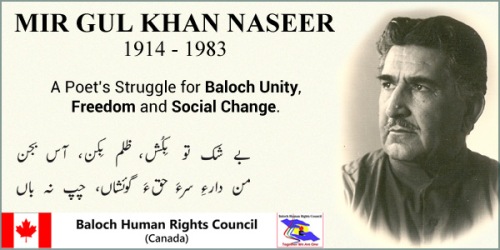
No comments:
Post a Comment